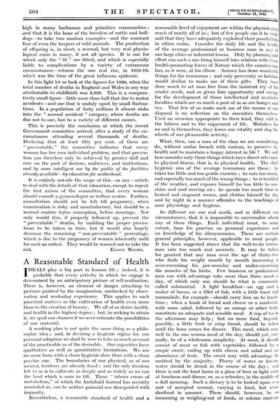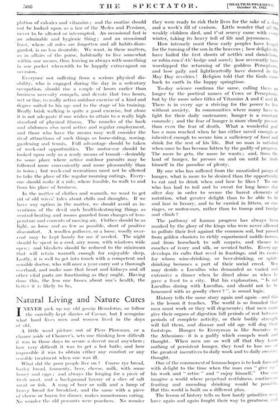A Reasonable Standard of Health I DEALS play a big part
in human life ; indeed, it is probable that every activity in which we engage is determined by an anticipatory, picture of self-realization. There is, however, an element of danger attaching to pictures painted by the imagination, unchecked by obser- vation and workaday experience. This applies to such practical matters as the cultivation of health even more than to the creation of beauty. We all of us desire health, and health in the highest degree ; but, in seeking to attain it, we spoil our chances if we over-estimate the possibilities of our material.
A working plan is not quite the same thing as a philo- sophic idea ; and, in devising a hygienic regime for our personal adoption we shall be wise to take as much account of the practicable as of the desirable. Our capacities have qualitative as well as quantitative limitations. We are no more born with a clean hygienic slate than with a clean psychic one. The boundaries of our physical, as of our mental, territory are already fixed ; and the only freedom left to us is to cultivate as deeply and as widely as we can the land which is ours to till. Those " inborn errors of metabolism," of which Sir Archibald Garrod has recently reminded us, can be neither gainsaid nor disregarded with impunity.
Nevertheless, a reasonable standard of health and a reasonable level of enjoyment are within the physiological reach of nearly all of us ; but of few people can it be truly said that they have adequately exploited their possibilities in either realm. Consider the daily life and the health of the average professional, or business man in any of our large cities or industrial towns. Only by planning and effort can such a one bring himself into relation with those health-promoting forces of Nature which the countryman has, as it were, at his elbow. Science has done wonderful things for the townsman ; and only perversity or faddism would decline to make use of these gifts. They have done much to set man free from the insistent cry of his cruder needs, and so given him opportunity and energy for the development of those intellectual and aesthetic faculties which_are as much a part of us as are hunger and sex. That few of us make such use of the means at our disposal is no reflection on the amenities themselves. Used on occasion appropriate to their kind, they add to the fulness and to the enjoyment of life. Mistaken for an end in themselves, they lower our vitality and clog the wheels of our pleasurable activity.
What, then, can a man of the class we are considering do, without undue breach with custom, to preserve his 'health and to maintain a happy interest in life ? We will here consider only those things which have direct relevance to physical fitness, that is, to physical health. The chief hygienic sins of the average townsman are these : he takes too little and too gentle exercise ; he eats too much, and especially too much of the wrong things ; he is terrified of the weather, and exposes himself far too little to sun- shine and cool moving air ; he spends too much time in heated and stagnant rooms, and clothes himself by day and by night in a manner offensive to_the teachings of sane physiology and hygiene.
So different are our real needs, and so -diffeient our circumstances, that it is impossible to universalize about any of theSe things. Each individual must, to some extent, base his practice on personal experience and On knowledge of his idiosyncrasies. There are certain general principles, however, applicable to most people. It has been suggested above that the well-to-do towns- man eats too much and unwisely. It may be taken for granted that any man over the age of thirty-five who finds his weight month by month increasing is over-exercising his jaw-muscles and under-exercising the muscles of his limbs. Few business or professional men can with advantage take more than three meals a ' day, of which only one should be what is commonly called substantial. A light breakfast—an egg and a rasher of bacon, or a fillet of fish, with a little toast and marmalade, for example—should carry him on to lunch- time ; when a hunk of bread and cheese or a sandwich, with some salad, followed by an orange or other fruit, constitute an adequate and-sensible meat A cup of tea in the afternoon may help ; but no- more food, beyond, possibly, a little fruit or crisp bread, should be taken until the hour comes for dinner. This meal, which may well be the one serious meal of the day; should yet, nor- mally, be of a wholesome simplicity. At most, it should consist of meat or fish with vegetables, followed by a simple sweet, ending up with cheese and salad and an abundance of fruit. The sweet may with advantage be omitted by the majority. Plenty of water or lemon- water should be drunk in the course of the day ; and there is not the least harm in a glass of beer or light wine at luncheon and dinner, or, as a refresher, in the middle of a dull Morning. Such a dietary is to be looked upon as a sort of accepted normal, varying in kind, .but stan- dardized in amount. There should, however, be no measuring or weighing-out of foods, or solemn contem- elution of calories and vitamins ; and the routine should not be looked upon as a law of the Medes and Persians, -never to he altered or interrupted. An occasional fast is 'an admirable and hygienic thing ; and an occasional feast, where all rules are forgotten and all habits disre- garded, is no less desirable. We want, in these matters, as in affairs of the purse, habitually to live somewhat within our means, thus leaving us always with something in our pocket wherewith to be happily extravagant on occasion.
Everyone not suffering from a serious physical dis- ability, who is engaged during the day in a sedentary occupation, should rise a couple of hours earlier than business necessity compels, and devote that two hours, wet or line, to really active outdoor exercise of a kind and degree suited to his age and to the stage of his training. Really brisk walking is quite a good exercise, but alone it is not adequate if one wishes to attain to a really high standard of physical fitness. The muscles of the back and abdomen also need active and regular employment, and those who have the means may well consider the rival attractions of such things as horse-riding, rowing, gardening and tennis. Full advantage should he taken of week-end opportunities. The motor-car should be looked upon only as a ready means of transit—desirably ;to some place where active outdoor pursuits may be followed more conveniently and more pleasurably than in town ; but week-end recreations must not be allowed ..to take the place of the regular morning outings. Every- one should make it a rule, where feasible, to walk to and from his place of business.
. In the matter of clothes and warmth, we want to get rid or old wives' tales about chills and draughts. If we have any option in the matter, we should avoid as in- ventions of the devil such health-destroying things as central-heating and rooms guarded from changes of tem- perattire and currents of moving air. Clothes should be as light, as loose and as few as possible, short of positive discomfort. A woollen pullover, or a loose, woolly over- coat may be kept handy for use if needed. The night should be spent in a cool, airy room, with windows wide open ; and blankets should be reduced to the minimum that will retain warmth enough for enjoyable sleep. Lastly, it is well to get into touch with a competent and sensible doctor, who will once a year carry out a thorough overhaul, and make sure that heart and kidneys and all other vital parts are functioning as they ought. Having done this, the less one fusses about one's health, the better it is likely to be.



























































 Previous page
Previous page